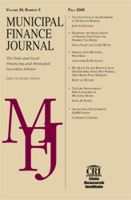Paradigm Shift of Municipal Credit Analysis
Author: Andy Shin.; Daniel DiSalvo.; Sarah F. Anzia.
Source: Volume 41, Number 01, Spring 2020 , pp.73-107(35)

next article > |return to table of contents
Abstract:
The conventional approach to analyzing municipal credit fails to uncover the true fiscal dynamics of struggling state and local governments. Traditional credit factors such as finance, budget, debt, pension, management, and governance reveal the symptoms and manifestation of underlying driving forces rather than the root causes of credit issues. In many cases, the root causes are political in nature and stem from policymakers’ strong political incentives to make fiscally imprudent decisions. Recognizing these incentives and their resulting policies can provide powerful insight into the credit trajectory of state and local governments. In this session, the panelists discuss political incentives and policies that have shaped the fiscal conditions of state and local governments across the United States and the ways in which those conditions continue to constrain fiscal reform efforts. This article is based on a discussion by the same title conducted at the 36th Annual Conference of the National Federation of Municipal Analysts held in Charleston, South Carolina, May 7–10, 2019. Andy Shin is vice president at Municipal Credit Research, BNY Mellon Asset Management North America. Daniel DiSalvo is a professor of political science at the City College of New York-CUNY and a senior fellow at the Manhattan Institute. Sarah F. Anzia is an associate professor of public policy and political science at the Goldman School of Public Policy at the University of California, Berkeley. The conference proceedings are being published in a special double issue of Municipal Finance Journal, as Volume 40, Number 4 and Volume 41, Number 1.Keywords: Municipal credit factors, state and local governments, fiscal reform, political incentives, government policies
Affiliations:
1: BNY Mellon Asset Management; 2: City College of New York; 3: University of California, Berkeley.